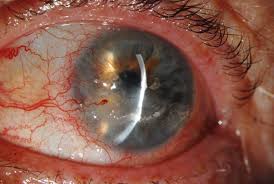Herpes Zoster ophthalmicus(HZO)
Herpes Zoster ophthalmicus Herpes Zoster Ophthalmicus (HZO), also known as shingles in the eye, is a viral infection caused by the reactivation of the varicella-zoster virus—the same virus responsible for chickenpox. When the virus reactivates, it can affect the skin around the eye and, in some cases, the eye itself. This condition can cause significant discomfort and, if not treated, lead to complications like vision loss. What Causes Herpes Zoster Ophthalmicus? HZO is caused by the varicella-zoster virus, which lies dormant in the nerve cells after someone has recovered from chickenpox. Years or even decades later, the virus can reactivate due to a weakened immune system, stress, or aging, causing shingles. When the ophthalmic division of the trigeminal nerve (the nerve that controls sensation in the face) is affected, it leads to Herpes Zoster Ophthalmicus. Who is More Prone to Herpes Zoster Ophthalmicus? While anyone who has had chickenpox can develop HZO, certain individuals are at a higher risk of experiencing this viral reactivation. Here are some of the factors that increase susceptibility Older Adults: People over the age of 50 are at a higher risk, as the immune system weakens with age, making it easier for the virus to reactivate. Weakened Immune System: Conditions that compromise the immune system, such as HIV/AIDS, cancer, or autoimmune diseases, can make individuals more prone to HZO. Those undergoing chemotherapy or radiation therapy are also at increased risk. Use of Immunosuppressive Medications: Individuals on medications like steroids or drugs used after organ transplants (e.g., to prevent organ rejection) have an increased risk of developing HZO. Stress and Fatigue: Physical and emotional stress, combined with prolonged fatigue, can weaken the immune system, triggering a reactivation of the virus. History of Chickenpox or Shingles: If you’ve previously had chickenpox or shingles, you are at risk of developing Herpes Zoster Ophthalmicus as the virus remains dormant in the body. Symptoms of HZO Pain and Tingling: The initial symptom is often a tingling, burning sensation, or pain on one side of the forehead or around the eye. Rash: A red rash or small blisters typically appear on the forehead, eyelids, and sometimes the tip of the nose. Eye Involvement: Redness, swelling, light sensitivity, and eye pain may develop if the virus affects the eye itself. Blurred Vision: Vision may become blurry or hazy, especially if the cornea (the clear front part of the eye) is involved. Fever and Fatigue: Some people may experience general symptoms like fever and feeling tired. How is Herpes Zoster Ophthalmicus Diagnosed? HZO is usually diagnosed based on clinical signs and symptoms. An ophthalmologist will look for the characteristic rash and may perform an eye examination to check for any involvement of the cornea, retina, or optic nerve. Slit-lamp examination: To look closely at the structures inside the eye. Visual acuity test: To check for any changes in vision. Blood tests or viral cultures: In some cases, these may be used to confirm the presence of the varicella-zoster virus. Complications of Herpes Zoster Ophthalmicus Corneal Scarring: This can lead to permanent vision loss if the cornea is damaged. Glaucoma: Increased pressure in the eye can occur due to inflammation. Postherpetic Neuralgia: Even after the rash heals, some individuals may experience long-term nerve pain in the affected area. Vision Loss: Severe cases can lead to partial or total vision loss if the eye is significantly damaged. Treatment Options for Herpes Zoster Ophthalmicus Antiviral Medications Acyclovir, Valacyclovir, or Famciclovir are commonly prescribed antiviral drugs that help shorten the duration of the infection and lessen its severity. These medications are most effective when started within 72 hours of the onset of symptoms. Corticosteroids Eye drops or oral corticosteroids may be prescribed to reduce inflammation in the eye. However, they should only be used under the guidance of an eye doctor. Pain Relievers Over-the-counter pain medications or prescription painkillers may be used to alleviate discomfort during the active phase of the infection. Lubricating Eye Drops: Artificial tears can help with dryness and discomfort caused by the inflammation of the eye. Treatment for Postherpetic Neuralgia If long-term nerve pain persists after the rash heals, your doctor may prescribe pain medications, nerve blocks, or other therapies to manage the pain. Prevention of Herpes Zoster Ophthalmicus One of the most effective ways to prevent HZO is through vaccination. The shingles vaccine (Zoster vaccine) is recommended for adults over 50, as it can significantly reduce the risk of developing shingles and HZO. If you’ve had chickenpox or shingles before, getting vaccinated can still lower your chances of a recurrence. Why Choose Shanthi Nethralaya for Herpes Zoster Ophthalmicus Treatment? At Shanthi Nethralaya, we offer personalized care for patients with Herpes Zoster Ophthalmicus. Our well-trained optometrists and ophthalmologists provide thorough eye examinations, ensuring early detection and treatment of this condition. With a commitment to using the latest technology and treatment options, our experienced team helps manage the infection and prevent long-term complications like vision loss. One Patient at a Time : At Shanthi Nethralaya, every patient is given individual attention during their consultation, ensuring that all your concerns are addressed. Whatsapp Icon-email Instagram Youtube Icon-map-marker1



